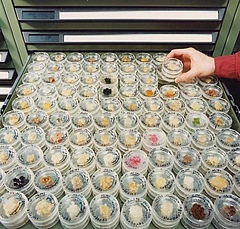The Nagoya Protocol Creates Disadvantages for Many Countries when Applied to Microorganisms

Plant cell cultures at DSMZ. Photo: DSMZ
Note for the media: Use of the pictures provided by iDiv is permitted for reports related to this media release only, and under the condition that credit is given to the picture originator.
Braunschweig. The currently restrictive implementation of the Nagoya Protocol threatens to hinder basic microbiological research and is likely to achieve the exact opposite of the Protocol’s stated goals. Instead of facilitating the “fair and equitable sharing of benefits arising from the utilization of genetic resources” the Protocol’s enforcement might actually exclude developing countries and their scientists from international research and collaboration, according to Professor Jörg Overmann and Dr. Amber Hartman Scholz of the Leibniz Institute DSMZ - German Collection of Microorganisms and Cell Cultures. Their analysis of the situation was recently published in Trends in Microbiology, a well renowned journal in the field. Prof Jörg Overmann is also a member of iDiv.
Read more in the press release of DSMZ:
https://www.dsmz.de/home/details/entry/the-nagoya-protocol.html
